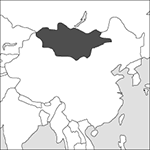
Source: MAPS IN MINUTES™ © RH Publications (1997)
Capital:
Ulaanbaatar
Area:
1,564,116 sq km (603,909 sq miles)
Population:
3,226,516 (2013 est)
Currency:
1 tugrik=100 mongo
Religions:
Buddhism 53.0%; Muslim 3.0%; Shamanist 2.9%; Christian 2.2%
Ethnic Groups:
Khalkha 81.9%; Kazakh 3.8%; Dorbed 2.7%
Languages:
Khalkha Mongolian (official); minority languages and dialects
International Organizations:
UN; Colombo Plan; Non-Aligned Movement; WTO; OSCE
A country in central Asia, bordered by Siberia, Russia on the north and China on the south. It was formerly known as Outer Mongolia (Inner Mongolia is now an autonomous region of China).
Physical
Mainly a high, barren plateau, Mongolia has mountains and saline lakes in the north-west and the Gobi Desert in the south-east. In winter it is very cold, and rainfall is light. Even so, there are areas of steppe on which livestock can be supported, and some grain is grown.
Economy
Mongolia’s former dependence on aid and imports from the Soviet Union left a difficult economic legacy when the Soviet Union collapsed, but the country has succeeded in making the transition from a planned to a free-market economy. The traditional nomadic pastoral economy based on animal breeding is still significant, with livestock, meat, and other animal products being exported. However, Mongolia’s considerable mineral resources are being exploited: copper, fluorspar, and coal are significant exports; and gold, molybdenum, uranium, tin, and tungsten have attracted investment.
History
Although Mongolia is named after the Mongols, up to the 12th century they only controlled a small area near the sources of the Orkhon River, and other nomadic tribes, such as the Merkit and Naiman, held greater power in the Eastern steppes. In the 13th century, however, the Mongols swept out to create the Mongol empire. In the 16th century they were converted to Lamaism. During the 17th century the Manchus won control of Inner and then of Outer Mongolia.
Outer Mongolia remained part of the Chinese empire until the fall of the Qing dynasty in 1911, although Russia mounted an increasingly strong challenge for the area in later years. While the neighbouring region of Inner Mongolia remained in Chinese hands, Outer Mongolia seized independence in 1911 and reasserted it after brief Chinese and White Russian occupations in 1919–21. Outer Mongolia became communist in 1924 as the Mongolian People’s Republic and remained so, following a policy of alliance with the Soviet Union. In July 1990 it became a multiparty democracy, but the Communist Party, now the Mongolian People’s Revolutionary Party (MPRP), retained power under Dashiyn Byambasuren. Trade with the former Soviet Union fell and, with price deregulation, an economic crisis developed, leading to rationing of basic foodstuffs. Mongolia adopted a new democratic constitution in 1992, which legalized private ownership. A general election, held in 1992, was again won by the MPRP. Punsalmaagiyn Ochirbat, first elected President in 1990, was re-elected in 1993, in the first direct presidential elections. In subsequent elections in 1996, the opposition Democratic Union coalition won a landslide victory and formed the first non-Communist administration for over 70 years. The Communists won the 2000 legislative elections and returned to power; however, they were obliged to rule in coalition after the indecisive 2004 elections. The following years saw a volatile political situation with a succession of short-lived governments. The presidential election in 2009 was won by the Democratic Party's Tsakhiagiin Elbegdorj, the first non-Communist to hold the position. He was re-elected in 2013. The Democratic Party gained the most seats in the 2012 election and subsequently formed a number of different coalitions. In the 2016 elections the Mongolian People’s Party won a landslide victory and Jargaltulgyn Erdenebat, a former finance minister, was chosen as Prime Minister. He faces the challenge of tackling Mongolia’s increasingly weak economic situation caused by the global decline in demand for mineral resources.
- phase delay
- phase-detect autofocus system
- phase detector
- phase deviation
- phase diagram
- phase difference
- phase discriminator
- phase distortion
- phased linear array
- phased retirement
- phase-encoded
- phase II metabolism
- phase I metabolism
- phase inverter
- phase lag
- phase layering
- phase-locked loop
- phase-lock loop
- phase modulation
- phase of a complex number
- phase plane
- phase problem
- phase response
- phase rotator
- phase rule